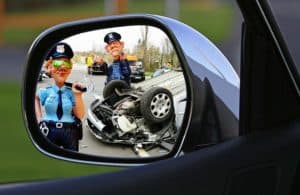 Aggravating circumstances are what cause stricter penalties for a crime. For instance, in many states, when you are caught shoplifting items over a certain value, you could face a felony charge, even if it is your first offense. An innocent bar brawl that causes serious injury or death is another example. The same goes for drinking and driving. A first-offense DUI with a blood alcohol concentration (BAC) that is well above the legal limit of .08 percent could result in a felony charge. High BAC is an aggravating circumstance for a DUI. So is any other crime that occurs during the course of your DUI. Like stealing a police car.
Aggravating circumstances are what cause stricter penalties for a crime. For instance, in many states, when you are caught shoplifting items over a certain value, you could face a felony charge, even if it is your first offense. An innocent bar brawl that causes serious injury or death is another example. The same goes for drinking and driving. A first-offense DUI with a blood alcohol concentration (BAC) that is well above the legal limit of .08 percent could result in a felony charge. High BAC is an aggravating circumstance for a DUI. So is any other crime that occurs during the course of your DUI. Like stealing a police car.
If you’re already in trouble for drinking and driving, please keep the other crimes to a minimum.
When you are out drinking and driving, you are a big enough risk to everyone else on the roads. You could hurt yourself or any passengers. Compounding that with additional crimes will only increase what you face in court. Besides, nobody has ever written a story about the DUI driver who stole a car in a panic and drove him or herself to freedom. It just does not work like that.
All states have aggravating and mitigating circumstances that can increase or decrease penalties for DUI, respectively. Obvious crimes, like child endangerment, high BAC, or injury to others during the DUI will result in longer ignition interlock requirements, possible jail time, and additional non-DUI charges at times. Mitigating circumstances (like your BAC wasn’t quite at the legal limit, but you were still charged) could help reduce your penalties. Stealing a police car will not help your case, but it will definitely invoke the ire and frustration of your local law enforcement, as well as the judges you face throughout your court requirement.
